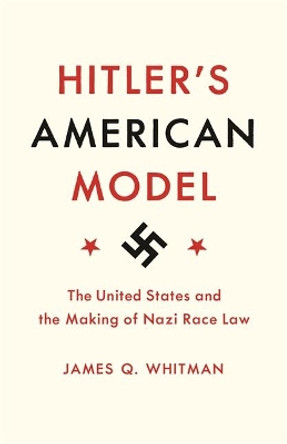Description
About the Author
James Q. Whitman is the Ford Foundation Professor of Comparative and Foreign Law at Yale Law School. His books include Harsh Justice, The Origins of Reasonable Doubt, and The Verdict of Battle. He lives in New York City.
Reviews
"A small book, but powerful all out of proportion to its size in exposing a shameful history."--Kirkus "Interesting and eye opening... In spite of the Nazis' disdain, to put it mildly, for our stated and evident liberal and democratic principles, they eagerly looked to the United States as the prime example for their own goals of protecting the blood, restricting citizenship, and banning mixed marriages. Reading this book could make many Americans doubt the possibility of ever forming a more perfect union with such a legacy."--Thomas McClung, New York Journal of Books "The admiration for American immigration policy expressed in Mein Kampf was not a passing thought on the day's news ... Nor a one-off remark. Its place in the full context of Nazi theory and practice comes into view in Hitler's American Model... Many people will take the very title as an affront. But it's the historical reality the book discloses that proves much harder to digest. The author does not seem prone to sensationalism. The argument is made in two succinct, cogent and copiously documented chapters, prefaced and followed with remarks that remain within the cooler temperatures of expressed opinion."--Scott McLemee, InsideHigherEd.com "Stunningly well-timed."--Tim Stanley, Daily Telegraph "[This] new history argues convincingly that institutionalized racism and common-law pragmatism in the United States inspired Hitler's policies... Historians have downplayed the connection between Nazi race law and America because America was mainly interested in denying full citizenship rights to blacks rather than Jews. But Whitman's adroit scholarly detective work has proved that in the mid-'30s Nazi jurists and politicians turned again and again to the way the United States had deprived African-Americans of the right to vote and to marry whites. They were fascinated by the way the United States had turned millions of people into second-class citizens."--David Mikics, Tablet Magazine "Whitman argues convincingly that American jurisprudence-federal and state alike-provided both inspiration and a model for the most radical Nazi lawyers."--Matthew Harwood, Reason "Hitler's American Model is overall, an erudite, well-researched, and thought-provoking study that raises important questions about America's laws - and leaders - in the not-so-distant past."--Rafael Medoff, Haaretz "In Hitler's American Model: The United States and the Making of Nazi Race Law, James Whitman ... makes a stunning and unsettling claim about the Nuremberg Laws."--Glen Altschuler, Jerusalem Post "Through intensive scrutiny of German language transcripts and other primary sources that he translated himself, Yale Law School professor James Whitman develops a story in Hitler's American Model: The United States and the Making of Nazi Race Law of unintended American inspiration for the infamous Nazi anti-Jewish laws. It's a story that will shock readers."--David Wecht, Pittsburgh Post-Gazette "Eerie... [Whitman] illustrates how German propagandists sought to normalize the Nazi agenda domestically by putting forth the United States as a model."--Brent Staples, New York Times "In his startling new history, Whitman traces the substantial influence of American race laws on the Third Reich. The book, in effect, is a portrait of the United States assembled from the admiring notes of Nazi lawmakers, who routinely referenced American policies in the design of their own racist regime... Whitman's book contributes to a growing recognition of American influences on Nazi thought."--Jeff Guo, Washington Post
Book Information
ISBN 9780691172422
Author James Q. Whitman
Format Hardback
Page Count 224
Imprint Princeton University Press
Publisher Princeton University Press
Weight(grams) 425g









